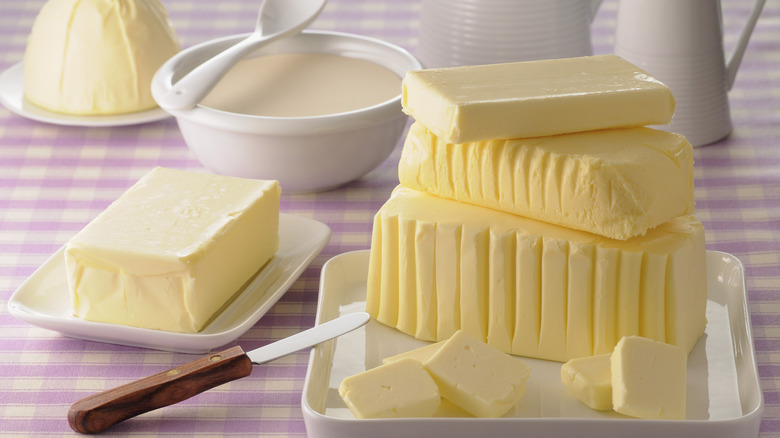The Catholic Butter Ban That Built A Cathedral (& Led To The Reformation)
Julia Child once said, "With enough butter, anything is good," and it seems that this same sentiment has been true for centuries. Human's relationship with butter is in no way new. Back in Ancient Rome, butter was actually swallowed whole to help cure a sore throat, and later during the middle ages, butter churned up so much controversy that it might have irrevocably changed Europeans' relationship with the church. While people today might look at butter as a more indulgent fat, back in the 15th century, it was considered downright sinful. Butter became a popular food item during the Middle Ages when it started to be commonly consumed in European countries like France and Germany. While the product wasn't consumed much in Italy, the Catholic church took a strict stance on consuming it during Lent. According to the church, meat and dairy could fuel lust and therefore were not to be consumed during the time of holy fasting.
So, the church banned Catholics from consuming any butter, but there was an asterisk to their rule. The church allowed their followers to pay a fee that would allow them to consume butter (as well as meat and dairy) while they were forbidden. French Catholics preferred to pay over abstaining, and the church raised so much money that it actually built the Rouen Cathedral from those butter taxes. Today, one of the Rouen Cathedral's towers is known as "Tour de Beurre" — the Butter Tower.
Butter up the Protestants
At that time in history, fasting days were not just limited to Lent — most people practiced fasting at least three days each week. The Roman Catholic church, based in Rome, was run by men who consumed mostly olive oil as their fat of choice, and fish in lieu of meat and poultry, so restricting themselves from butter (as well as eggs, meat, and dairy) wasn't such a huge deal. In fact, many people believed that butter caused leprosy, so they avoided it anyway.
Those that lived in northern countries, where dairy farming was their way of life, had a harder time. Meat and dairy were their staple food items, and if you didn't have money to keep paying the church a spiritual tax to consume what you wanted, then these rules were akin to starving yourself. Martin Luther called BS. His mounting frustration with the church, including this practice of banning foods and then selling forgiveness, was one of the reasons that Martin Luther penned his 95 Theses and broke away from the church. It was an easy sell to those who survived on meat and dairy to say "ciao" to the Catholic church, so oddly, butter helped lead to the Protestant Reformation and ensured its success.

